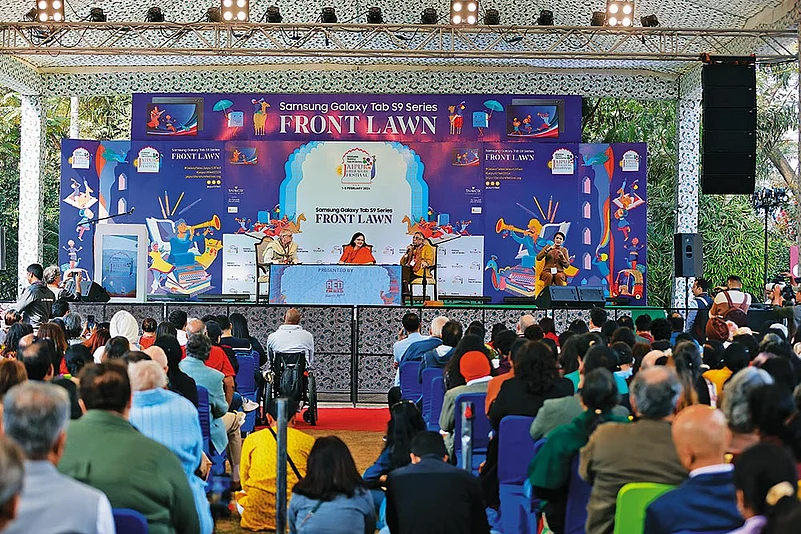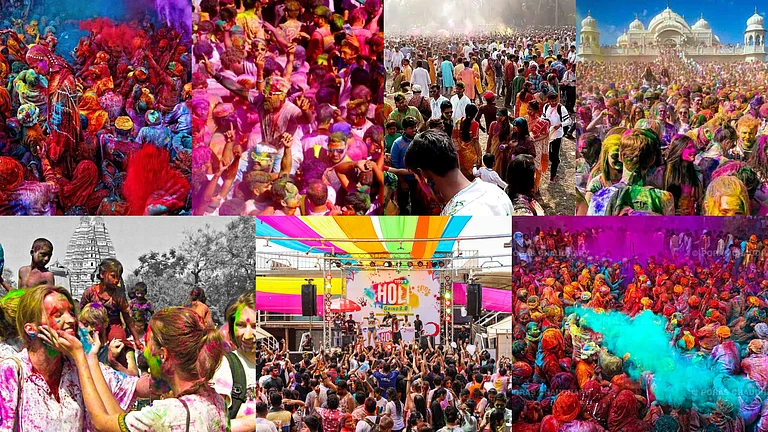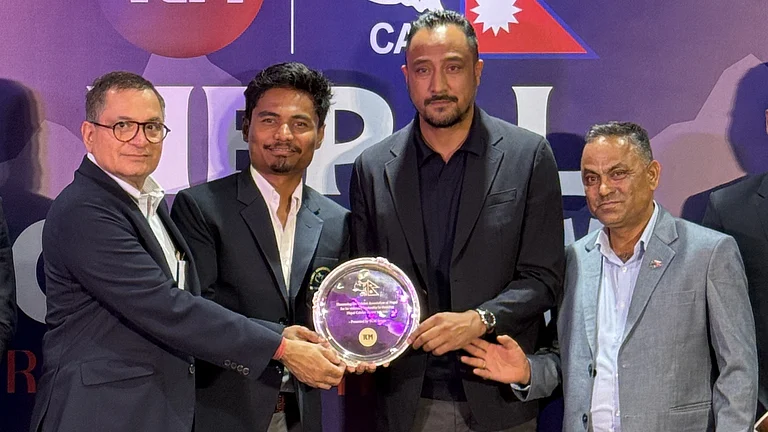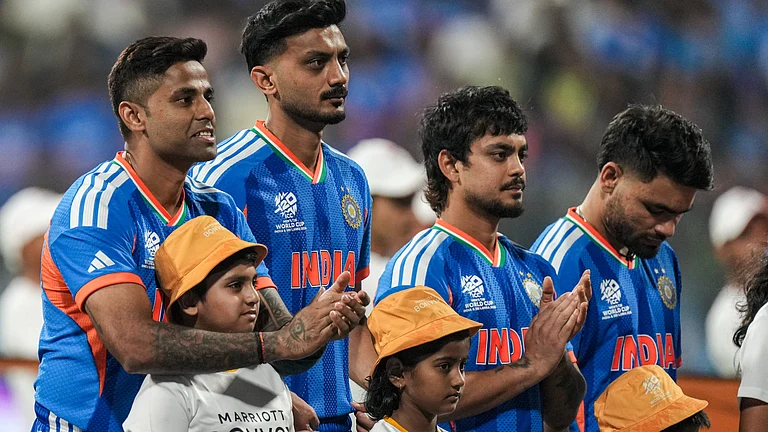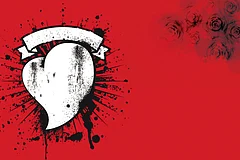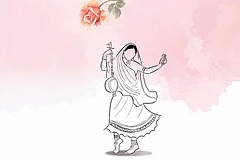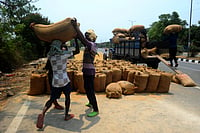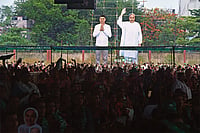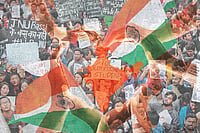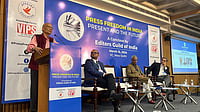“The world is ending right now…” warned Paul Lynch, celebrated Irish novelist and winner of the 2023 Booker Prize for his dystopian novel Prophet Song, on the opening day of the Jaipur Literature Festival 2024. This was a theme running through India’s premier literary fete this year, as American author Kai Bird gave interview after interview, explaining the life and misery of J Robert Oppenheimer, the US scientist behind the atomic bomb whose biography has witnessed a surge of interest following the blockbuster success of last year’s Christopher Nolan film based on it.
Bird said that the “Faustian bargain” that the ‘father of the nuclear bomb’ had made by helping develop the most devastating weapon humanity has ever known haunted him throughout his life and attempts at atonement eventually resulted in him becoming a pariah for the US establishment.
“We live in divisive times and a turbulent world, with several wars going on, and part of the reason why the film and the book have suddenly become popular is because it is a timely reflection of our current world,” Bird told Outlook in a chat.

And yet, the opulent celebration of Indian and world literature and art managed to merely skirt around the imminent doomsday scenarios, firmly rooted in its quasi-medieval royal fervour and repetitive celebrations of a syncretic past that has begun to appear almost mythological or made-up now as we are surrounded by growing religious assertion in all spheres of public and political life.
“Dress like royalty in jewel tones with a bit of silver,” exhorted an invite for a post-sessions party on the opening day. “Bring in the classics with black and gold,” said another for a cultural evening on February 4, incidentally hosted by the newly-elected Deputy Chief Minister of Rajasthan, Diya Kumari, a member of the erstwhile royal family of Jaipur. The city palace in the capital—managed by the royal family—was the venue for one of the famed annual parties on the sidelines of the festival thrown by a major publisher, lit with hundreds of lamps and spectacular chandeliers, as turban-wearing waiters deftly moved among a crowd consisting of a large number of expat historians, novelists and poets, along with the who’s who of the Indian literary scene in English.

In a corner sat traditional musicians playing live music—mostly Bollywood tunes—although they did perform a fine rendition of Malkauns when asked. One could almost imagine a Mughal court in all its glory and perceived harmony, an era that the festival continues to hark back to, with a host of sessions on topics such as music in Mughal India, and a history of Indian perfumes. However, outside the halls of the wannabe royal venue of the event—with sessions being held at ‘Durbar Hall’ and ‘Mughal Tent’ among other seating arrangements—Mughals and their real or perceived descendants may not exactly be the toast of the town.
Echoes of the ongoing conflicts and travesties in the world and the country did find a way through to some sessions, such as one on Palestine where the ongoing war in Gaza was laid bare unequivocally. But these were few and far between, and seemed muffled compared to the intensities of the everyday violence that has occupied our screens and pages to the point of driving us to numbness. A direct discussion on what has been happening in Manipur was glaring in its absence. Instead, a session on the “core issues and changing realities of the North Eastern States” aimed to do so by exploring “the natural treasures and rich cultural diversity of the region”.
As largely young crowds thronged the venue in large numbers, despite rain playing spoilsport on February 4, free speech advocates and secularists crossed paths with revivalists and right-wing ideologues. Usual suspects like Shashi Tharoor and Devdutt Pattanaik continued to draw large crowds, with the first talking about “saving democracy” and repeating his popular narrative against the British Empire, and the latter discussing his recent book on Jainism. While on a parallel stage, RSS Joint General Secretary Manmohan Vaidya held forth on how Hinduism had been the most tolerant society with no concept of blasphemy, and argued that the Varna system was not based on birth and was non-discriminatory in its ancient form. However, the free (for-all?) speech did seem frayed at the edges at times, such as when a speaker in the Palestine session attempted to draw a parallel to Kashmir and was immediately stopped by the host.

Filmmaker Vishal Bhardwaj, talking of non-mainstream films and OTT content in a press conference, hastily interrupted a young journalist in his question, insisting that he had never mentioned the word “censorship”, even though it had been used by the journo only in the context of audiences preferring masala films in recent times. Minutes later, in response to another question, Bhardwaj declared that he would be happy to make a movie on senior BJP leader Lal Krishna Advani, recently awarded the Bharat Ratna, if given a chance. Free speech in its JLF avatar probably peaked in another post-sessions party—events that probably best represent the corporate-driven world of JLF—organised by a liquor brand.
On a rooftop overlooking Jaipur’s city lights, soon after dusk appeared Gurmehar Kaur, who had shot to fame in 2016 for advocating peace between India and Pakistan despite being trolled online. It turned out that Kaur is now a brand ambassador for the whiskey being served at the cocktail, and she held forth on the virtues of the drink for budding writers and its subtle flavours.
As an executive standing next to her invited the audience to raise a glass with them, the response was rather muted, as people waited for a music performance to follow. On the other end of this spectrum, in the smallest pavilion of the JLF—called the Jaipur Bookmark—activist-publisher Gita Ramaswamy talked of struggling to stay afloat as an Indian-language publisher focusing on grassroot issues and authors from marginalised groups. She made no bones about her derision for the event and mainstream publishers, highlighting how commissions and royalties sought for book distributions and rights were squeezing out small publishers, and the zeal to bring out Adivasi, Dalit, LGBT and other marginalised voices in Indian languages appeared missing in the new generation.
Seeing no heirs in sight for her Telugu-English publishing house, which suffered a crushing blow during the Covid-19 pandemic, Ramaswamy confessed she had come to the JLF in a last-ditch effort to keep the important work going, having rejected invitations in the past.
As the world watches the events in Gaza, Ukraine, and closer home in Manipur with muted horror, and establishments are either unable to prevent widespread violence or are actively complicit in it, this year’s edition of India’s biggest international literary event continued to meander through a curious juxtaposition of near-Orientalist focus on a glorious past and a post-modern mélange of takes on politics and society, with a little bit of everything as token representation, but failing to take a stand when it matter the most.
MORE FROM THIS ISSUE
In the election year, when religious and caste fault lines are sharpening and voices of dissent are either silenced by authorities or ignored by the mainstream media, India’s literary establishment has chosen to not exactly look away but rather put out beach chairs, to watch the apocalypse from a safe distance, with a sponsored cocktail in hand, of course!






